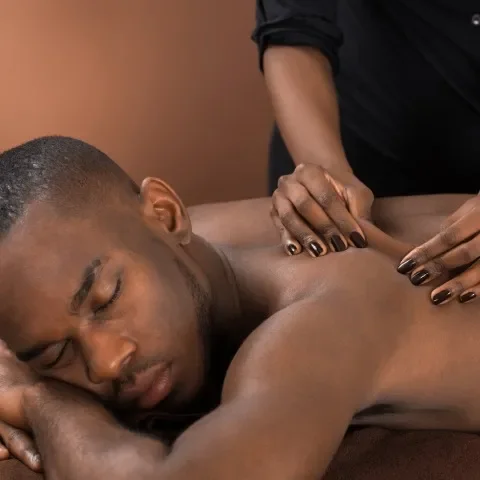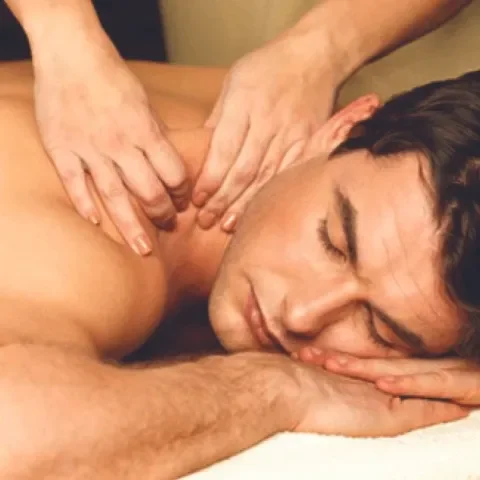5 Ways Massage Therapy Can Improve Your Athletic Performance
Key Takeaways:
Performance Enhancement: Massage therapy serves as a powerful performance tool, promoting flexibility, improving circulation, and enhancing mental clarity.
Expert Athlete-Focused Care: PRESS offers targeted services that align with the unique needs of athletes and active individuals.
Recovery Optimization Tips: Smart strategies like staying hydrated, communicating with your therapist, and maintaining consistency can significantly boost your massage benefits.
For athletes and active individuals, massage plays a vital role in maintaining peak physical condition, going beyond simple relaxation. From easing tight muscles to improving how your body moves, regular massage may help reduce the risk of injury, support more effective recovery, and contribute to overall physical readiness. It’s a smart, effective way to take care of your body so you can keep doing what you love.
In this piece, we’ll explore five ways massage therapy can help improve your athletic performance — and how PRESS can support your goals.
Why Massage Matters for Athletes
Athletic performance isn't just built in the gym — it's supported by recovery, restoration, and smart body care. Whether you're training for a marathon, hitting personal records at the gym, or simply living an active lifestyle, your muscles take a hit. That's where massage therapy steps in as a game-changer.
Massage therapy is more than a luxury; for athletes, it may be a helpful tool to support physical recovery, improve mobility, and manage injury risks. By targeting muscle tension, boosting circulation, and calming the nervous system, regular massage can keep you in peak condition physically and mentally.
At PRESS, licensed professionals understand the needs of active bodies. Our targeted sessions help athletes address pain points, recover smarter, and improve performance over time. You can explore our services or book a session today to experience the benefits firsthand.
1. Reduces Muscle Soreness and Speeds Up Recovery
After a tough workout or intense competition, muscle soreness can hit hard — and linger longer than you'd like. This soreness, often caused by microscopic muscle damage, is a natural part of building strength. However, it can also slow down progress if recovery is neglected.
Massage therapy is believed to aid circulation, which may assist in clearing metabolic byproducts like lactic acid, while also increasing blood flow to fatigued muscles. This process may support oxygen and nutrient delivery, potentially aiding your body’s natural recovery process. Athletes who incorporate massage into their recovery routines often experience shorter downtime between workouts and improved training consistency.
PRESS offers focused techniques designed to ease muscle tension and speed up healing. Whether you’re dealing with post-workout fatigue or delayed onset muscle soreness (DOMS), PRESS therapists are trained to support recovery through intentional, therapeutic touch. That may mean shorter recovery periods — helping you stay active and consistent with your training.
2. Improves Flexibility and Range of Motion
Mobility is a cornerstone of athletic performance. Whether you're sprinting, lifting, or flowing through yoga poses, flexibility and range of motion can directly influence how efficiently — and safely — you move. Tight or restricted muscles can limit your performance and increase your risk of injury.
Massage therapy may help reduce muscle tightness, release fascial tension, support improved mobility, and reduce adhesions or “knots” that can build up over time. This may enhance the flexibility of muscles and connective tissues over time, allowing for greater freedom of movement. Regular massage can also correct muscular imbalances that develop from repetitive training patterns, helping you move more fluidly and with better form.
PRESS therapists use a combination of techniques tailored to your body's needs — from deep tissue work to stretch-focused modalities — that promote long-term flexibility and mobility. If you're looking to deepen your movement potential and perform at your best, PRESS offers a reliable and professional environment to support your goals.
3. Boosts Circulation and Oxygen Delivery
Efficient circulation is essential for athletic performance. Your muscles depend on a steady flow of oxygen-rich blood to function at their best during training and competition. Likewise, proper circulation supports faster healing and reduces fatigue by removing metabolic waste from the body.
Massage therapy is believed to stimulate blood flow by stimulating soft tissue and encouraging the dilation of blood vessels. As circulation improves, oxygen and nutrients are more effectively delivered to muscles, tendons, and ligaments — supporting endurance, strength, and overall recovery.
For athletes, this means more than just feeling energized. Enhanced circulation can help reduce swelling, ease inflammation, and accelerate recovery from minor strains. PRESS incorporates targeted massage work that promotes healthy circulation while focusing on areas that carry the most tension or overuse. It’s a proactive step toward keeping your body functioning like a well-oiled machine.
4. Supports Injury Prevention and Healing
Injuries can sideline even the most disciplined athletes, but many are preventable with the right body care routine. Massage therapy may help manage muscle imbalances and support the body’s healing process after physical strain when it occurs.
By loosening tight muscles, improving alignment, and relieving stress on joints, massage helps correct imbalances that could otherwise lead to overuse injuries. It also improves proprioception — your body’s sense of position and movement — which enhances coordination and reduces the likelihood of sudden strains or sprains.
For athletes recovering from an injury, massage may support tissue flexibility during recovery and reduce stiffness around injury sites, improve joint function, and stimulate lymphatic flow to reduce inflammation. PRESS offers therapeutic approaches that align with your body’s stage of recovery, whether you’re coming back from a pulled muscle or working through chronic tightness.
With consistent sessions, you’re not just healing — you’re building resilience for the long run.
5. Enhances Focus and Reduces Performance Anxiety
Athletic performance isn’t only physical — it’s mental. Focus, clarity, and calm are key elements of success, whether you're on the field, in the gym, or facing down a finish line. But stress, anxiety, and pre-competition nerves can cloud your mindset and affect how your body responds under pressure.
Massage therapy may support nervous system regulation and is associated with reduced cortisol levels in some individuals (the stress hormone) and promoting the release of neurotransmitters such as serotonin and dopamine, which are linked to mood regulation. This creates a sense of calm and well-being, helping athletes stay centered, focused, and confident in high-stress moments.
PRESS creates an environment that fosters both physical and mental recovery. Our therapists understand how important mindset is to performance — and provide a space where your body and mind can reset. Whether it’s pre-event tension or general burnout, massage offers a natural way to stay mentally sharp and emotionally balanced.
Where to Get Expert Massage Therapy for Athletes
If you’re ready to experience the performance benefits of massage therapy, it’s important to choose a massage studio that understands the needs of athletes. That’s where PRESS stands out.
PRESS isn’t just another massage studio — it’s a team of licensed professionals who specialize in helping active bodies feel and function better. Whether you're dealing with muscle fatigue, recovering from an injury, or prepping for your next athletic milestone, PRESS offers services tailored to your goals. Our licensed therapists use a combination of techniques to address deep tissue tension, support recovery, and improve mobility — all within a welcoming and professional environment.
From weekend warriors to competitive athletes, PRESS provides an accessible and effective recovery experience. Explore our full list of services to find the right fit, or book an appointment now to take the next step in optimizing your performance.
Final Thoughts
Athletic performance is about more than effort — it’s about how well you recover, rebuild, and prepare for what’s next. Massage therapy may complement every phase of your training cycle — potentially easing muscle soreness, improving mobility, and supporting mental focus. It’s a widely used tool to support body care and recovery routines and extend your athletic longevity.
By following a few smart tips — like staying hydrated, timing sessions wisely, and staying consistent — you can get even more out of your massage routine. Whether you're a seasoned athlete or just starting your fitness journey, regular massage is a proactive step toward becoming stronger, faster, and more balanced.
Ready to integrate massage into your performance plan? PRESS offers athlete-focused services tailored to your needs. Explore our service menu and book a session today — your body will thank you, and your future performance will show it.
Read also:
Frequently Asked Questions About Massage for Athletes
What type of massage is best for athletic performance?
While deep tissue massage is commonly used, the best massage depends on your goals. Athletes may benefit from a combination of techniques like trigger point therapy, myofascial release, or sports massage tailored to their training cycle.
Can massage therapy replace stretching in an athlete’s routine?
No, massage is a complement, not a substitute. Stretching helps maintain flexibility and joint health, while massage targets deeper muscle tension and promotes circulation.
How soon after a workout should an athlete get a massage?
Generally, it's best to wait at least 24 hours after intense exercise. This gives your muscles time to begin the natural healing process, allowing massage to support recovery without causing additional strain.
Is massage therapy safe during injury rehabilitation?
Yes, but it should be guided by a healthcare provider. Certain types of massage can support healing and improve mobility when incorporated at the appropriate stage of recovery.
How often should athletes get massages for optimal performance?
Most athletes benefit from massage once every 1–2 weeks. Frequency may increase around intense training periods or decrease during rest phases, depending on individual needs.
Does massage therapy improve sleep quality for athletes?
Yes — massage activates the parasympathetic nervous system, promoting relaxation and deeper sleep. Quality rest enhances muscle recovery, mental focus, and overall performance.


